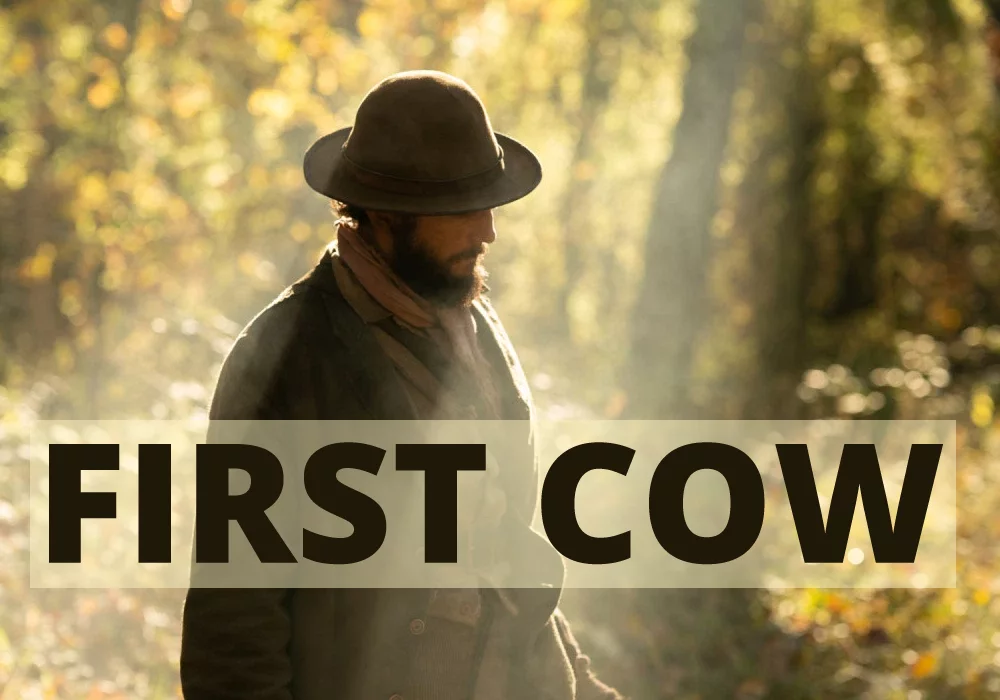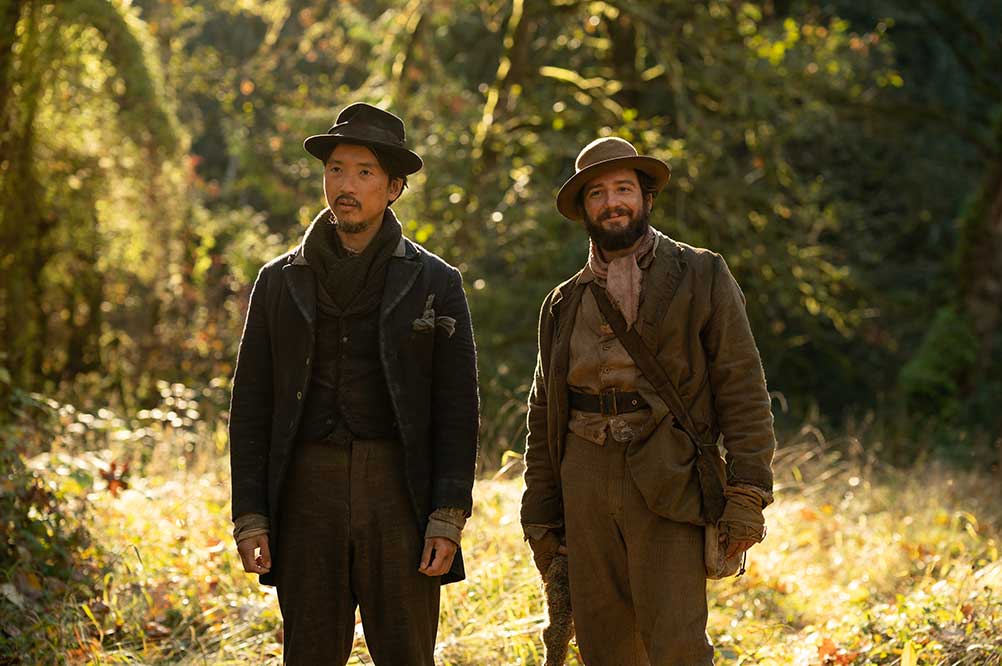Kelly Reichardt’s latest film about the myth of the American West, First Cow, follows two men searching for a better life elsewhere that’s always just slightly out of reach. Pre-order our book about First Cow and the films of Kelly Reichardt here.

Kelly Reichardt’s latest film about the myth of the American West, First Cow, follows two men searching for a better life elsewhere that’s always just slightly out of reach. Cookie (John Magaro) and King-Lu (Orion Lee) live in 19th-century Oregon, but the film begins in the modern day with a wordless prologue. A woman (Alia Shawkat) and her dog wander the Oregon woodland and uncover the skeletons of two men lying side by side in the dirt. These, we later presume, are Cookie and King-Lu; the film follows their sweet, burgeoning friendship and their quest to fulfill modest dreams, while the spectre of death hangs over their heads.
When I interviewed screenwriter Jon Raymond for our upcoming book about Kelly Reichardt’s work and First Cow, he said that Cookie is “antithetical to the normal cowboy western character. He is unconventional but also totally ubiquitous in the western film genre. He’s never the protagonist per se, but he appears in probably hundreds of movies — for a total of about ten minutes.” Working as a cook-for-hire for a traveling fur-trapping group, Cookie is withdrawn and quiet, treated as a social outcast. When two of the men get into an ultra-macho fight over something totally insignificant, it provokes Cookie to hightail it out of there into the busy wilderness. This solitude marks the first time Cookie feels calm, and William Tyler’s soothing score seeps into the soundscape.
A friendship between humans instead of human and animal is a rarity in Reichardt’s films, so this story of genuine friendship is particularly lovely. They’re an odd couple: Cookie, the quiet and homely one; and King-Lu, the charismatic entrepreneur. But they’re bonded by their outsider status: King-Lu is a Chinese immigrant being chased by Russians for theft; Cookie is Jewish and rejects conventional masculinity. Cookie first finds King-Lu hiding naked and hungry amongst shrubbery, and on the run. King-Lu flashes a smile and calmly asks for food and shelter. Cookie, a kind soul and an orphan, extends his hospitality, even helping King-Lu to stay hidden.
Cookie is only able to relax when he’s at peace with nature and away from aggressive men. Quite early on in the film, two of the men Cookie is travelling with get into an ultra-macho fight about something totally insignificant, provoking Cookie to briskly run away into the bushy wilderness. Only here, in quiet solitude does William Tyler’s soothing score seeps into the film’s soundscape. For a director whose films so often depict characters trying and failing to connect, it’s lovely to see Reichardt centre a narrative around a genuine friendship — which doesn’t involve an animal as in Wendy and Lucy — for perhaps the first time ever. Not to say that there isn’t plenty of sweet human-animal bonding in First Cow. (Magaro told me that Evie, who plays the eponymous cow, was a delight to work with and “better than most actors.”) But the heart of the film is Cookie’s and King-Lu’s bond. King-Lu is an ambitious dreamer who actually listens to Cookie’s own dreams and pushes him to fulfill them, something that’s all too rare in individualistic America.

First Cow depicts male domestic intimacy in a refreshingly casual way, a contrast to Reichardt’s last film about male friendship, Old Joy (2006), which was full of awkward homoeroticism. As Raymond writes in his novel, The Half-Life, upon which First Cow is based, “He [Cookie] realized America wasn’t a country, but a place in your mind, a place with your friends.” The film opens with a William Blake quote that shares a similar sentiment: “The bird a nest, the spider a web, man friendship.” In one of First Cow’s warmest, most serene sequences, Cookie visits King-Lu’s small home for the first time, and we observe the two men settling into a kind of domestic bliss. They chop wood, cook, clean, and share the same frame with the familiar ease of a married couple. Cookie doesn’t have a home so King-Lu invites him to stay in his ramshackle little hut. Does this sequence take place over hours, weeks, days, months? It’s unclear; their time together, before they involve themselves in criminal activity, is a calm, tranquil oasis of togetherness and co-operation, the likes of which Cookie has never experienced before.
When the first cow to arrive in the region floats to the town on a raft, Cookie and King-Lu steal her milk and get rich by selling milky baked goods back to the cow’s owner. The cow’s owner is the Chief Factor (Toby Jones), a rich ex-Londoner who presides over the film’s small-town Oregon setting. Cookie and King-Lu concoct a scheme to steal the cow’s milk and bake it into delicious and lucrative “oily cakes,” which even the Chief Factor himself loves: “I taste London in this cake!”, he proclaims. Their illicit biscuit-baking business grants them the Chief Factor’s respect and employment, as well as an invitation to his manor house. The cruel irony is that these two men can only get “in” with the rich (and become rich themselves) by stealing from them — a move that eventually comes back to haunt them.
While Cookie and King-Lu steal more and more milk, saving up so that they can journey to San Francisco, Reichardt introduces a rich cast of characters who also foolishly dream of better things. “Everyone’s here,” King-Lu proclaims. “They’re all looking for that soft gold.” A couple shots of the late René Auberjonois, staring into the distance with a crow perched on his shoulder, convey an old man who has long since learned that chasing The American Dream is a fool’s errand. A poor young soldier’s assistant looks on longingly and bitterly as the men of the town indulge in Cookie’s oily cakes; he will later take out his bitterness on Cookie in a damaging way, naively believing that harming another man will bring him closer to his own goals. Meanwhile, the two Native women, one married to the Chief Factor and the other to a Chinook Chief, watch the men around them barter with and build on the land that is rightfully theirs; we witness the two women excitedly sit together and start to chat as soon as the men leave the room, only able to relax and be themselves around each other.
Historically, Reichardt’s films have depicted restless characters living stagnant lives. See homeless Wendy in Wendy and Lucy (2008), whose problems worsen when her car breaks down and leaves her frustratingly stuck. Or Lily Gladstone’s Rancher in Certain Women, who tries and fails to make a romantic connection that might liven up her mundane routine. By contrast, First Cow‘s Cookie is a character in transit who desperately wants to settle down in one place. He doesn’t seem as interested in upward mobility as King-Lu, who always insists they steal milk for just a little bit longer, intent on increasing their profits but at increasing risk of capture. Cookie’s dreams are modest: he wants to open a hotel to house other people like him, travellers who haven’t got a place to call home. Yet in Reichardt’s world, even the most modest of dreams — to have an income, a home, a friend — are just out of reach for those without means or social power. At least it was sweet while it lasted.
Want to read the rest of the article?
Get the ebook.
Roads to nowhere: Kelly Reichardt’s broken American dreams will take you on a journey through Reichardt’s filmography.
It’s also the only place you can find interviews with her and all her collaborators, which together reveal Reichardt’s filmmaking process like never before.

